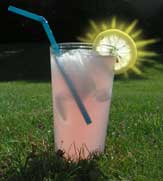|
|

Five Senses of Summer
“Children, like animals, use all their senses to discover the world.”
|
|

|
Writers have a trick for pulling readers into a scene. They use three or more senses in their description. (This is a great tip for budding authors, as well.) So, as a main character wanders into a carnival, for instance, she might see the brightly colored lights; hear the calliope music on the merry-go-round; and smell the hot, roasted peanuts. She might also taste cotton candy or feel the worn grip on the roller-coaster car. It's fascinating how effective this little trick is. Watch for it in the next novel you read.
When you think about it, isn't it wonderful that God has gifted us with so many senses? How much poorer our experiences would be if we only had one - if we could see the ocean but not hear the waves or smell the salt air.
Much of what we experience we don't notice. You might remember what you ate for dinner last night, but can you remember how it tasted? It's easy to rush through each day without really living it. But part of thankfulness, I believe, is learning to savor the gifts that are given to us.
With that in mind, I recently asked my family to give me examples of great sensations of summer. Here's what they came up with:
|
Sights: short grass, empty schools, fireflies and fireworks.
Sounds: crickets, marching bands, the hum of fans, and the slap of flip-flops.
Smells: sun screen, barbecue, wood-smoke, and the ocean.
Tastes: fresh corn, grilled food, salt water and honeysuckle.
Things you feel: sand, a hot breeze, grass under bare feet, and bee stings.
|
Try the same with your kids. Write down their suggestions. Then use it as a “wish list” and try to experience as many as possible - except, of course, the bee stings.
And if they can't think of many, don't worry. They'll have a whole summer of sensations to sample.
Bruce Van Patter
|